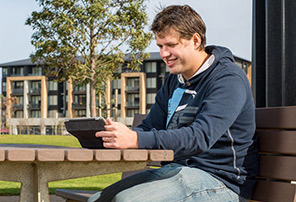This degree is only available to Australian students
You're an Australian student if you are any of the following:
- Australian or New Zealand citizen
- Australian Permanent Resident (including Permanent Humanitarian Visa holders)
Please remember your residency (the country you are currently in) has no impact on whether you are an Australian or International student.
Associate Degree in Data Analytics
Degree Level Undergraduate
Year 2025
-
View full entry requirements Hide full entry requirements
Entry requirements
Admission criteria
The admission criteria have been grouped to assist you to easily find the information most relevant to your circumstances. However, you may fit into more than one and the university will consider applicants against each of the relevant criteria.
Certain conditions apply. For more information refer to Appendix 4 of the University's Selection and Entry policy.
The admission criteria have been grouped to assist you to easily find the information most relevant to your circumstances. However, you may fit into more than one and the university will consider applicants against each of the relevant criteria.
Certain conditions apply. For more information refer to Appendix 4 of the University's Selection and Entry policy.
Applicants are required to meet one of the following criteria with a competitive result:Higher education study
- Successfully completed equivalent to a minimum of half a year of full-time study over a higher education program at a recognised higher education provider
OR
Vocational Education and Training (VET)
- Complete an award from a registered training organisation at Certificate IV or above
OR
Work and life experience (for domestic students only)
- Passed a UniSA Online literacy and numeracy test and have relevant work experience, or
- Completed a 12-month UniSA Foundation Studies program or equivalent, or
- Qualify for Special Entry
OR
Recent secondary education
- Completed a secondary education qualification equivalent to SACE, such as an interstate year 12 or international qualification
Essential requirements for admission
Prerequisites
NoneAssumed Knowledge
None
Degree overview
- Fast-track your data science career with industry-recognised qualifications in just two years.
- Learn how to collect, manage, and convert raw data into usable information.
- Explore data visualisation tools as well as programs and techniques for data acquisition and cleaning.
- Build a solid foundation in database design, R statistical software and cloud platforms.
- Learn how to select and implement the appropriate data structures and algorithms to develop software and solve problems.
- Explore the ethics of data collection and what it is to be a data analytics professional.
- Study courses co-developed with industry.
Snapshot

Jump-start your data analytics career with industry-recognised qualifications in just two years. In this associate degree, you’ll gain foundational skills in programming, data mining and visualisation, database administration, and cloud computing to take your place in the growing data analytics industry.
Develop critical skills in problem solving, mathematics and statistics and learn the tools available to collate, manipulate, analyse and visualise data. You’ll also have the opportunity to study courses co-developed with industry, put theory into practice within simulated work environments, and explore real world case studies.
Take full control over your study with this 100% online Associate Degree in Data Analytics designed specifically for online learning. Access support seven days a week, plan your study to fit around your life, view learning resources 24/7, and log into the interactive online environment anywhere, any time and on any device.
Study with a university ranked top 10 in Australia for graduate skills in IT1 and graduate with the qualification and skills to step into a data analytics career with confidence.
1Ranked #8, ComparED (QILT) Student Experience Survey 2021-22, Computing and Information Systems – Skills Development Indicator (Undergraduate). Public universities.
What you'll learn

The Associate Degree in Data Analytics will give you critical skills to prepare you for a career working with data, as a data engineer, data architect, or data analyst. You’ll learn how to collect, manage, and convert raw data into usable information so that it can be interpreted and evaluated to help any organisation thrive.
You’ll learn the historical contexts of computing, including hardware structure, operating systems, and basic programming concepts, as well as the fundamentals of IT. You’ll use the latest tools and techniques for data acquisition and data cleaning, learn how to create dynamic websites that query databases to retrieve information, and how to select data and the appropriate algorithms to generate insights from data.
Sometimes how you learn to study is as important as what you study. In your first term, the Critical Approaches to Online Learning course will help you prepare for university success and further study. You’ll choose a data analytics topic to investigate and then learn how to summarise academic articles, critically analyse texts, generate ideas, interpret data, write a report, demonstrate academic integrity and reference sources of information. We’ll also introduce you to the many digital tools available to help you succeed in study. Already uni ready? You’ll have the option to choose an elective instead.
All UniSA Online degrees take a practical, hands-on approach to learning. You’ll explore real world examples of cases relevant to the industry and develop skills relevant to data analytics professional practice.
Explore the degree structure section below to find out more about what you’ll learn in each individual course.
Why Associate Degree in Data Analytics

This degree helps you get industry-recognised qualifications, fast.
The National Skills Commission lists data analytics as 1 of 25 emerging occupations, with demand growing 492% in just four years.1
With an associate degree, you’ll have the chance to quickly transition to a new data analytics career or advance if you’re already working in the sector. You’ll also be eligible for admission to the Bachelor of Data Analytics, with up to 72 units of credit. This means you could gain a bachelor degree with just one more year of study.
UniSA delivers world-class research in Information Technology2 and Computing and Information Systems3 and is home to world-leading research centres including the Future Industries Institute, Innovation and Collaboration Centre and Australian Research Centre for Interactive and Virtual Environments.
What does this mean for you?
You’ll learn from the best of the best, with UniSA academics integrating research discoveries into your course curriculum. You’ll also learn using the latest technology and software so you can hit the ground running when you graduate.
1 National Skills Commission, Emerging Occupations Report, Australian Government 2020, www.nationalskillscommission.gov.au.
2 Results in Information and Computing Sciences -2018 Excellence in Research for Australia (ERA).
3 Results in Distributed Computing and Information Systems -2018 Excellence in Research for Australia (ERA).
Your career
This is a broad and generalist data analytics associate degree that will allow you to take your career in several different directions.
Big data is on the rise, and the sheer volume of data being collected is not showing any signs of slowing. Data analysts who can extract, translate, visualise, and communicate information are in high demand, with data analysts earning around $92,000 a year on average.1
The Associate Degree in Data Analytics from UniSA Online will help you gain access to entry level, data-based positions in almost every industry sector, such as:
- data engineer
- data analyst
- data scientist
- business data strategist
- data architect
- data visualisation specialist
- reporting analyst.
You’ll also be eligible for admission to the Bachelor of Data Analytics, with up to 72 units of credit. This means you could achieve a bachelor degree with just one more year of study.
1 Data analyst salary in Australia, Indeed, December 2022, au.indeed.com
Thinking of studying soon?
Your study experience and support
Study On Demand
Our online career-focused degrees give you full control and ultimate flexibility over your study. It’s Study On Demand, on your schedule, on your terms.
- Study 100% online - no need to come onto campus
- Choose from four start dates in January, April, June and September
- Learn in 10-week blocks
- Get support seven days a week - including on weeknights
- Access learning resources 24/7
- View course content before your term starts
- Work while you study
- Plan your study schedule ahead of time
- Fast-track your studies and receive credit for past study and/or work experience.
IT Requirements
As a general rule of thumb, any desktop or laptop computer purchased in the past three years should be capable of meeting your online learning needs. While mobile devices such as tablets and smartphones will be able to access most of your online course content, there are likely to be elements of most courses where we recommend you use a desktop or laptop computer. Your computer should be able to:
- run a modern browser (Microsoft Edge, Firefox 24, Safari 5, or Chrome 32 or later versions)
- run Java
- run programs to create documents, spreadsheets and presentations
- use a web camera and headset (or ear pods with microphone)
- Some UniSA Online degrees require an online exam. The online exam software – Remote Proctor Now – has specific capability requirements. Please refer to the system requirements prior to conducting your exam to ensure your computer is compatible.
Access free IT software and resources
As a UniSA Online student, you'll:
- Get free access to the full Office 365 ProPlus suite, which includes full versions of Word, PowerPoint, Excel, Outlook, OneNote, Publisher, Access and Lync software. Install the full suite on up to five different devices (PC and Mac compatible).
- Get 1Tb of personal storage that syncs with your PC or mobile device through OneDrive - it's like an extra hard drive that allows you to open any of your files from any of your devices, whenever you need them.
- Get free access to LinkedIn Learning - Access more than 5000 video courses on a broad range of topics such as: the Microsoft Office suite, time management and study skills, health and wellbeing, communication and presentation skills, photography, film making and designing your own games or mobile apps.
- Be able to connect with others using Microsoft Teams, Yammer and the Outlook Web App.
There are some degrees that have specialised software requirements. We've made this software available to students to access for free - you'll be able to download and install any of the required programs on your own device anywhere and anytime. See if your degree requires specialised software.
Check your device
Our computer system test will determine if your device has the base system resources and software required to study online. It'll also check the speed of your internet connection.
See if your computer, laptop or device is all set up and ready to go – it takes just a few seconds.
The application process is easy – just follow these simple steps:
-
Check your eligibility
Take our eligibility checker and answer a few short questions to see if you’re eligible. You’ll be given an option to continue your application, save it for later or request a call back from a Degree Adviser if you have any questions. -
Gather your relevant documents
If you're eligible, you'll receive an email outlining the entry requirements and the relevant documentation you need in order to be considered.
In order to verify your academic qualifications, you'll need to upload relevant documents like your official parchment, certificates or transcripts. If you have work experience, you will need to upload your CV as well as any other documents like work references, professional recognition or accreditation or your training certification.
Your email will contain information on the specific documents you need to provide as well as a link to log in to your application. You'll be asked to create an account and set your own password. -
Complete your application and send through your documents
In order to proceed with your conditional offer, you’ll need to complete your application and provide required evidence of your previous study or work experience.
Alternative Pathways
Australian
There are other pathways you can follow to study this degree, including:
- UniSA College Diploma in STEM (Information Technology)
- UniSA College Undergraduate Certificate in University Studies (STEM)
- UniSA Online UniStart
-
When should I apply?
UniSA Online degrees start four times a year in January, April, June and September. There are key application dates for each term. If you're looking to apply for credit, there are different closing dates you need to be aware of, so it's always best to double check. Key dates can be found at unisaonline.edu.au/key-dates.
-
Do I have to be online at set times?
All of our courses are asynchronous, meaning you choose when to study, whenever it suits you. However, if your degree has online exams, you will need to sit these at a designated date and time. Some courses may also require you to speak to your academics via phone or online communication channels at a mutually agreed time as part of your assessment.
-
What academic support is available?
Our academics are available seven days a week, including weeknights. Throughout your degree, you’ll be supported by our highly experienced academic team of Online Course Facilitators and casual academics. Our teaching team will guide you through your learning and ensure you have an outstanding, high-quality education.
They can help you with your course materials and assessments, provide feedback on your work, assist you with referencing, and can answer any other course-specific queries.
You’ll be able to contact your academics via email, online discussion forums and live messages in the online learning environment. You can also communicate in real-time and chat face-to-face with your academics online.
If you need after-hours learning support, Studiosity is a great resource that can help you with your writing, academic language, grammar and referencing. You’ll also be able to chat online with a Studiosity online adviser.
-
How is my degree structured?
Full-time students study two courses each term. It makes earning a degree completely achievable, especially if you’re working. Your degree is delivered over four terms each year. Each term runs for ten weeks with two-week breaks in between each term.
You’ll also have the option to go part-time, or switch between the two. If you need to take a break in your study, that’s an option too. We recommend speaking to your Student Adviser who can help you update your study plan and check when your courses are offered.
-
What career prospects do I have with my university qualification?
Our degrees are designed in conjunction with industry experts, employers and professional associations, and informed by the latest developments in your field. You will graduate with in demand skills and up-to-date knowledge required by industry.
You will be studying with a university known for its employment outcomes. Your UniSA degree is more than just a piece of paper – it will prepare you to start your career, or take it to the next level. UniSA's online students have graduate employment rates well above the national average.*
UniSA Online qualifications follow the same Government Higher Education Standards Framework as our on-campus degrees. The parchment you receive at the end of your degree will be the same as any other University of South Australia student.
*UniSA External UG full-time employment rate 83% Graduate Outcomes Survey 2018
-
What are the main differences between online, on-campus and distance education?
The knowledge you gain from each mode of study is the same – it's how you get there that's different. When you study online, everything from your course material to weekly activities and assessments are fully online. You'll communicate with academic staff and students via live messages, online discussion forums and email.
Studying on campus requires students to physically come on to campus at specific times to attend lectures, tutorials and practicals. On-campus students have face-to-face contact with academics and fellow students and also communicate via email and online discussion boards.
Distance Education involves physical course material packages being sent to students, usually print based but occasionally audio or video. Communication is usually via telephone, mail and email. In today’s digital era, distance education has been superseded by online education.
More FAQs







